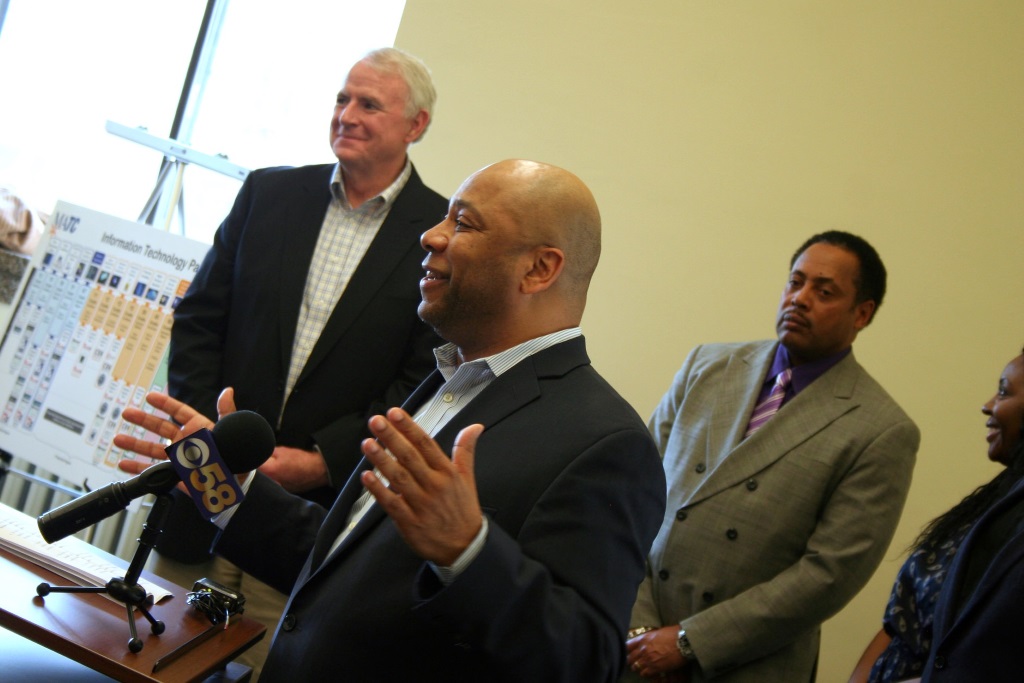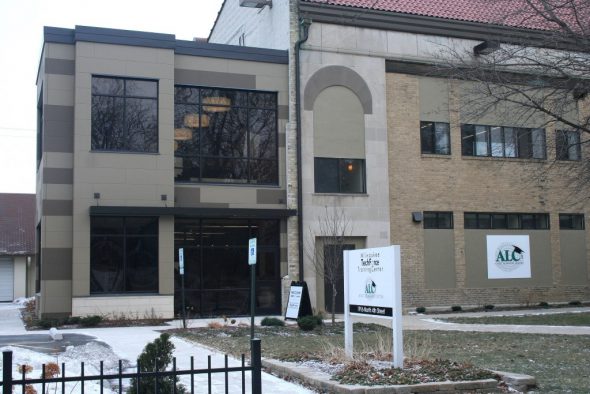TechForce Center Provides Path to Jobs
City-led program affiliated with MATC trains people for plentiful IT jobs.

Mayor Tom Barrett (left) and Employ Milwaukee Vice President of Community Relations Willie Wade (right) look on as Employ Milwaukee Executive Director Earl Buford speaks. Photo by Jabril Faraj.
The St. Francis Social Center, 1916 N. 4th St., owned by the Capuchin Franciscans, whose mission is to serve the poor, used to be a community gathering place for those of little means. It was also where riots, which swept across the nation in the long hot summer of 1967, started in Milwaukee.
Now, a group of public and private partners hope the 91-year-old old social center, which has been renamed the Milwaukee TechForce Training Center after renovations and additions early last year, will help provide area residents with technology education necessary to gain high-wage work in the Information Technology (IT) sector.
“To see educational opportunities come back onto the property, particularly for adults, and with the goal of improving their lives, improving their job opportunities, I think, is just tremendous and I’m excited about it,” said Father Michael Bertram, pastor of St. Francis of Assisi Parish, which is across the street from the center.
The TechForce Center will work in tandem with the 37-year-old Adult Learning Center (ALC), which is in the same building. ALC is a community partner of Milwaukee Area Technical College (MATC) and has occupied the building for about 10 years. It provides GED education and testing to about 120 individuals per semester. The TechForce Center will provide additional technical training in certifications that are often necessary for employment in the information and technology fields.

The Milwaukee TechForce Training Center, 1916 N. 4th St., sits across from St. Francis of Assisi Parish. Photo by Jabril Faraj.
ALC Executive Director Herb Hayden, who will also oversee the TechForce Center, said the goal is to provide people with the knowledge base to land jobs with “more than sustainable wages.”
“They’re like a family to me,” said Ann Perry, who grew up in foster care and struggled with depression and anxiety before earning her GED at ALC. Perry, who is studying to be a social worker at MATC, said she often goes back to volunteer. Once she earns her degree, Perry wants to work with youth.
“I didn’t have anybody there for me when I was younger. “If I can just help one person, you know, that person might, in turn, help somebody else and it’ll be a chain reaction.”
The center, a $1.3 million project funded by the Department of Housing and Urban Development (HUD) and led by the Housing Authority of the City of Milwaukee (HACM), includes a renovated and remodeled second floor. Paul Williams, community coordinator at HACM, said the space was previously used for storage.
Now, the second level, which houses the TechForce Center, boasts two high-tech classrooms, staff space and common areas for students to study or network. A new entrance, which provides access to both the ALC and TechForce, was also added, along with conference rooms and an elevator.
A group of 20 individuals, who began the first 10-week training program Monday, will work toward A+ certification, often a starting point for IT careers. The program will provide students with knowledge of computer hardware and software. S+ and Network+ certifications may be available to more advanced learners. Individuals with these certifications have the skills to manage storage systems, as well as troubleshoot, configure and manage data networks.
According to Ricardo Ybarra, director of adult services at Employ Milwaukee, once individuals have completed the course, they will be qualified for entry-level, “help desk-type jobs.” Ybarra said there are currently 14,000 IT jobs available in Milwaukee, 3,700 of which do not require a bachelor’s degree. Employ Milwaukee will oversee the training.
Hector Joseph, chief technology officer at Froedtert & Medical College of Wisconsin, told students on the first day of classes that he has 30 available jobs. The positions, mostly in medical records support, start at upwards of $15 per hour. Ybarra said Employ Milwaukee created an IT advisory board that helped define valuable skills for industry professionals; he hopes that group will provide a connection to jobs for students, as well.
“It takes more than just the technical skills to really move an individual on to an upward trajectory within the workplace,” said Ybarra. “We want to be able to not only have skilled technical folks but also good team players, as well.”
A portion of a grant awarded to the City of Milwaukee by the U.S. Department of Labor in June 2016 will fund training at the TechForce Center. Employ Milwaukee, which split the $12 million grant with United Migrant Opportunity Services Inc. (UMOS) and the Waukesha-Ozaukee-Washington Workforce Development Board, will administer the $4 million grant and has contracted with BLUE1647, a Chicago-based workforce development firm to provide training and other community events.
Ybarra could not say how much of those funds will go toward TechForce training.
Two cohorts of 20 to 25 individuals are expected to complete the training this year; three 10-week courses will be offered in both 2018 and 2019 with two more cohorts planned for the first part of 2020.
Employ Milwaukee will create a sustainability plan in an effort to continue programming after the funds are exhausted, said Chytania Brown, who leads the grant program.
HACM, which has taken out a 40-year lease on the building, has a long-term vision for the center, defined by Executive Director Tony Perez as the ability to create “economic uplift” on a large scale.
On the first day, students were hopeful and said they are looking forward to better employment opportunities after graduation. Paul Doblinger, who lost his job as a CNC (computer numeric controlled) machinist, needed something less physically taxing. Shenise Hill, 24, who previously worked at Walmart, hopes the course will increase her earning potential so she can better support her two young children.
Tanika Dixon, 42, earned an associate’s degree in 2000 and worked in IT but found herself in finance after the 2008 recession hit. For Dixon, who has worked temp jobs for the last three years, this is an opportunity to get back to what she loves.
“Right now, I’m not where I want to be, I’m not where I need to be, I’m not where I should be,” Dixon said. “So, hopefully, this can open up some doors, open up some opportunities for me.”
This story was originally published by Milwaukee Neighborhood News Service, where you can find other stories reporting on fifteen city neighborhoods in Milwaukee.





















